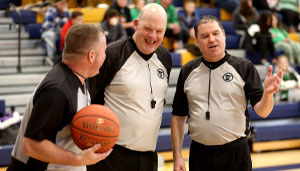Do you want to win so badly that you’re willing to sacrifice fundamentals? What is more important, winning or teaching? What should be stressed and emphasized in youth and high school sports? Teaching is more important than winning and should be stressed at all levels of sport. Without teaching, winning cannot and will not occur.
Imagine this scene at a highly-competitive youth football game on a beautiful early autumn Saturday afternoon. While the game is being played a coach receives a call on the sideline. He listens, and then signals to his players on the field. The players adjust, seeming to know what and where the next play is going. They seem to know what play is coming next, because they do.
After the game, the opposing coach goes back and watches the film. What he notices should come as a surprise, but sadly isn’t anymore. There was a man who was roaming behind his sideline (which he didn’t notice while coaching his team) who was calling the other coach to relay information to help his team win.
Yes, this is a true story. The coach could see plain as day on film what the opposing team was up to.
It’s sad. Is this what youth sports have come to? Here you see the effects of the win-at-all costs culture promoted by the NFL. We hear stories of this occurring at the highest levels of the game, and then see the trickle down effects in youth sports.
If the spying team were to win, which they didn’t, would the win even mean anything? Teaching is more important than winning because it lasts a lifetime. Coaches should focus on teaching the game along with life skills that can be learned through sport. If they do, they will be a winner on both fronts, on the field and in life.
Here are five thoughts to help coaches ensure teaching comes before winning:
- Hall of Fame coach Jack Ramsay once said, “The coach is the teacher; his subject is the fundamentals.” As long as a coach remembers this and keeps it as a priority he or she will be a success. This should serve as a guiding principle throughout a coaching career.
- As a coach, you are helping a player build their foundation on and off the court. You are helping them “Build Their House.” The great Paul Brown said, “Most players stop their development because of their intelligence, or lack thereof, rather than physical ability.” Simply put: Teach the Game!
- Players make plays. Do not forget that. Realize this and coach with it in the back of your mind. If you want to impact the game as a coach, impact the players. What would you rather have at the end of the game, three good plays or three good players?
- The game was here first. It will be here long after you’re finished coaching. No coach is bigger than the game. Focus on teaching a love for the game. If you do, it will foster a desire to be better and a will to win.
- Find your mission. If it’s solely to win, you’ll be empty and never reach true fulfillment. Victory comes from preparation. Want to be prepared? Focus on teaching players how to play the game. Focus on learning and teaching the trade, not the tricks to earn a W.
As coaches, our duty is to develop players. Teaching at every level is more important because it precedes winning. Teaching fundamentals provides athletes with the confidence to execute the skills necessary in competition. If we can develop our players as thinkers of the game, they will be prepared for any situation. Championship teams are comprised of individuals who are fundamentally sound and who are students of the game.
We love coaching and the thrill of winning. However, that thrill should never come before the lasting relationships we develop through teaching our athletes. There is more to coaching than winning. John Wooden considered himself a teacher before a coach. I’d like to think the same of myself. How about you?
Remember, teach players not plays.
In the words of the late, great coaching legend Don Meyer: Teach the Young. Share Your Affections. Leave Your Mark.
Kyle Elmendorf
Kyle Elmendorf is in his tenth year as a teacher and coach at Orchard Farm High School in St. Charles, Missouri. He is the head girls basketball coach and assistant football coach.
Most Recent Articles
- nfhs news NFHS Learning Center Delivers 25 Millionth Course
- Track & Field/Cross Country article Effective Communication with Athletes and Coaches
- nfhs news Player Equipment Changes Highlight 2025 High School Football Rules Revisions
- Player Equipment Changes Highlight 2025 High School Football Rules Revisions
- nfhs news Judgment Call on Second Contact Eliminated in High School Volleyball






